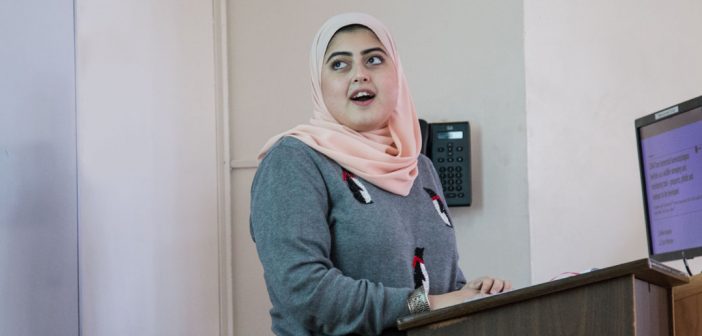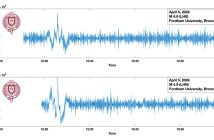The Fordham College at Rose Hill (FCRH) Undergraduate Research Symposium isn’t until next spring, but students got a sneak peek of what to expect through the Undergraduate Research Colloquium.
“At the beginning of the semester, I had the pleasure of meeting with our summer grant recipients,” said Rachel Annunziato, Ph.D., FCRH associate dean for strategic initiatives and associate professor of psychology. “And one of the many things I learned from that group is that students were hoping for an opportunity to hear more about their peers’ projects before the symposium.”
The Dec. 6 event, which was held in Keating Hall, featured short presentations from students studying biology, psychology, physics, integrative neuroscience, international political economy, chemistry, environmental studies and more. In all, there were 16 presentations.
The goal was to build community among student researchers and provide a platform for students to share their progress.
“I’m interested in starting my own research so I decided to come to get some ideas,” said sophomore Sandra Ivanov, a biology major. Sophomore Shubarna Akhter, who sat adjacent to her, nodded in agreement. “It’s good to see what students are getting funded to research,” she said.
Physics student William Charles spoke about the theories he is using to study the low-energy dynamics of quarks and gluons, while biology student Salma Youssef talked about how she is using the DNA of leeches to monitor biodiversity.
“It’s noninvasive so you can monitor biodiversity without putting in any cameras,” she said. “And it’s very cost-effective because all you really need are leeches, and they’re everywhere.”
Sophomore Emily Hargous, whose project sheds light on the seasonal molecular diets of urban coyotes, shared the inspiration behind her research. Since coyotes exhibit behavioral changes in an urban environment, Hargous wanted to know how they adjusted their diets to the presence of humans.
“The coyote diet changes seasonally in response to climate and prey,” she said.
As the event served as a primer to the upcoming 2018 symposium, William Beatrez, a junior majoring in chemistry, said speaking at the event helped him to brush up on his needed presentation skills.
“I’m planning to apply to graduate school for chemistry, and when you’re a Ph.D. student, writing grant proposals, presenting research, and speaking at different engagements are important,” said Beatrez, whose presentation was focused on glucose sensing. “This is exactly what my real-world life is going to be like.”



